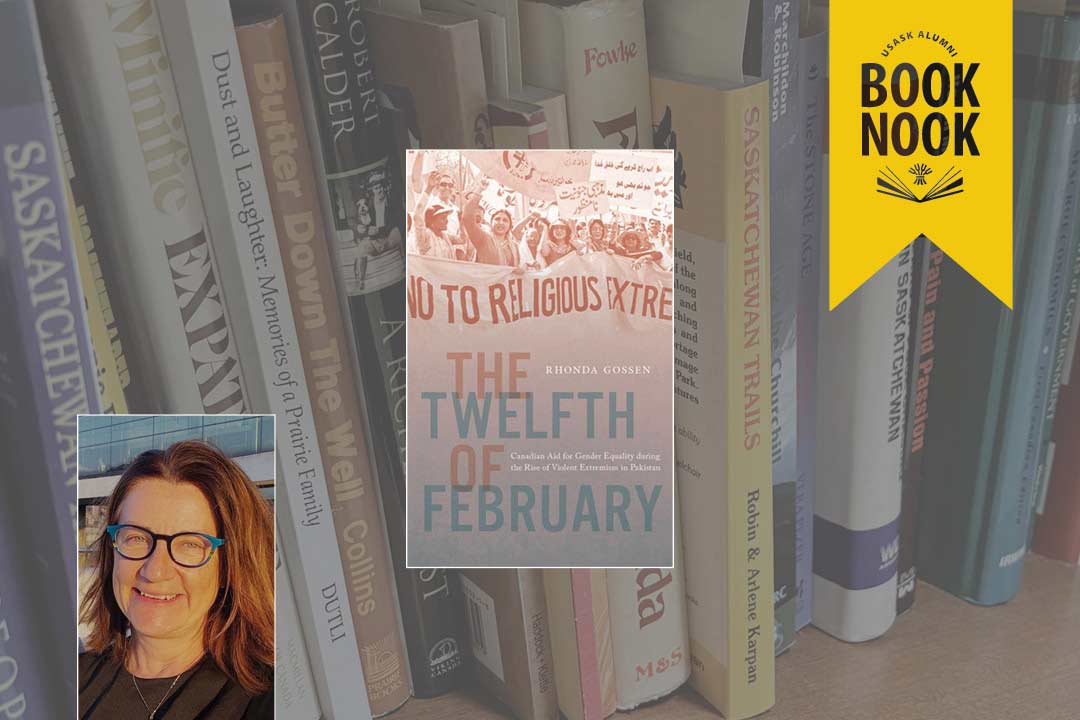
Alumni Book Nook: Rhonda Gossen (BA’83)
USask graduate and former Canadian diplomat Rhonda Gossen is the author of The Twelfth of February: Canadian Aid for Gender Equality during the Rise of Violent Extremism in Pakistan
University of Saskatchewan (USask) graduate Rhonda Gossen earned a Bachelor of Arts degree (honours) at USask’s College of Arts and Science in 1983, before embarking on an impactful career that has seen her serve as a Canadian diplomat, as a manager with the Canadian International Development Agency (CIDA), and as a consultant to the United Nations (UN).
Her first book, The Twelfth of February: Canadian Aid for Gender Equality during the Rise of Violent Extremism in Pakistan, was released on Sept. 15, 2024, by McGill-Queen’s University Press. According to the publisher, The Twelfth of February tells the story of the Canadian International Development Agency’s support for women’s organizations and civil society in Pakistan, with Gossen tracing “the ebbs and flows of financial aid, drawing on her own unique experience as a development worker as well as compelling interviews with activists, non-governmental organizations, officials, and diplomats. She assesses how women’s organizations work to resist violent extremism and makes the connection between gender inequality and security threats in a volatile region. Despite the influence of Islamic extremism, the gender equality movement in collaboration with civil society in Pakistan did make tangible headway.”
What have you been doing since you graduated from USask?
My career was with Global Affairs Canada both in Ottawa and as a diplomat abroad. I worked with the former Canadian International Development Agency (CIDA) in Asia and Africa. I now work as a senior consultant to the UN, the United Nations Development Programme (UNDP), and the UNHCR (the UN Refugee Agency).
What is the focus of your new book?
It is the story of Canada’s support for women’s rights and gender equality in Pakistan over more than three decades during the rise of the Taliban, and how women’s groups succeeded to push back against violent extremism at different levels, often with Canadian indirect support. The backdrop is the regional geopolitical context—the Afghanistan wars, in particular.
What inspired you to write this book?
I worked in Pakistan at three different phases of my career, beginning with a major research study in 1983 and ending with a diplomatic assignment in 2010-2014. I was watching the evolution of the impact of rising extremism on women’s rights and on development in the country. I was curious to know what had changed over the decades since CIDA’s first program to support women in development there.
Did your education at USask play a role in researching and writing this book?
Yes. My degree in political science and international studies inspired my interest in global politics and development and the political economy context around policy decisions.
Why would you recommend your book to USask alumni?
It is important history of the work Canada does in international cooperation through Global Affairs Canada—in particular, on the development side. Often when we think there is no impact, the solidarity with others on human rights and democracy makes a difference. Given the current regression on women’s rights in neighbouring Afghanistan and Iran, Pakistan stands out for its institutional and legal progress on women’s protection.
Is there anything else you would like to add?
New leading-edge research is cited on the link between women’s economic empowerment and preventing violent extremism in the book. The link between peace and security and gender equality is becoming clearer; research shows that countries with more gender equality engage less in conflict and are stronger global citizens and more prosperous and stable. Transforming traditional models of national security by adopting women’s rights and participation and access to resources as central objectives benefits entire societies.


